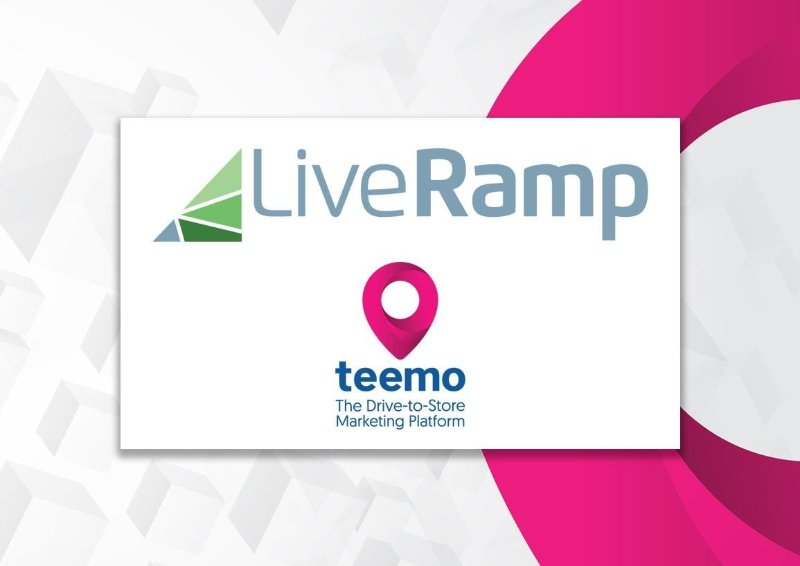LiveRamp and Teemo have partnered up to make retail marketing more effortless and effective. Teemo is a mobile location platform that personalizes mobile advertising in order to increase foot traffic and sales for retailers, restaurants, grocery and automotive brands. LiveRamp is an identity resolution provider offering data onboarding, which aspires to power a people-based marketing revolution.
With Teemo’s LiveRamp integration, marketers can tap into first-party CRM data and drive better performance based on a more complete picture of consumer activity. DMN readers may already be familiar with both Teemo and LiveRamp. I spoke with Benoit Grouchko, CEO of Teemo, earlier this year regarding the ways that location-based analytics could reinvigorate retail and supply data to intent marketing efforts.
In November, LiveRamp CEO Scott Howe told DMN that ethical data can light up customer experiences, and last year, DMN Editor-in-Chief Kim Davis directed questions to LiveRamp’s CMO in a podcast. Now, the two companies offer an integrated approach. What does it mean for the future of marketing?
Teemo bills itself as a drive-to-store platform. This integration makes those results visible, demonstrating the practical applications of location data. As a well-positioned third party, LiveRamp seemed like a natural partner for Teemo. Activity on the Teemo platform can now be matched to credit card transactions in stores, taking the guesswork out of marketing efforts.
“This partnership is key to driving more value to our customers as it allows us to match the visits we generate to actual offline sales at our customers,” explained Teemo CEO Benoit Grouchko.
Courtney Stuart, Teemo’s Managing Director for the US, said that as the marketplace has matured, retailers have increasingly expressed a desire to lean on tech in order to achieve the maximum possible ROI. Although Teemo was already delivering value, the company’s retail clients recognized that they were sitting on a lot of underutilized CRM data. They wanted to use it to finetune their marketing investments. Stuart said that the LiveRamp integration was a natural progression of the work being done with these retailers.
In particular, large retail enterprises with thousands of locations wanted to gauge their investments at individual store locations. They needed specificity. Some vendors in the mobile location space only offer aggregate reporting.
“With Teemo’s deterministic reporting that can deliver reports and optimize at the store level, you’re getting a much more granular report card of that investment,” said Stuart.
Stuart noted that people expect search engine advertising to deliver specific breakdowns of results. “If you buy 100 keywords, you want reporting at the keyword level, you don’t just want an aggregate report,” said Stuart. Efforts engineered around location data should function in a similar way.
The credibility and value of a location-based analytics platform largely depends on precision. That high-level of precision can’t be fully attained without first-party CRM data in the equation.
“It’s unbelievably important,” said Stuart. “We’re not panel-based, we’re not extrapolating a visit. When a visit occurs, it’s a unique device advertising ID that walks into that store, so we’re very rigorous about making sure that is precise.”
Stuart emphasized that Teemo relies on first-party deterministic data. This sets it apart from other vendor platforms.
“If you’re not running off of first-party deterministic data, you’re running off of panel-based or probabilistic data,” he said. “And so, if you are making assumptions off of probabilistic data, you don’t have the unique advertising IDs to tie back to a CRM file. With Teemo, a visit is a visit, and it’s a unique advertising ID that we drive into the store.”
Users of probabilistic, panel-based platforms may be able to estimate store visits when operating on a large scale, but those estimates are just that — estimates. Accuracy matters, and retailers could certainly benefit from a clearer picture of their investments.
On October 15th, Sears Holdings Corp. revealed plans to close 142 unprofitable or underperforming Sears and Kmart stores. The company has commenced liquidation sales at these locations. The previously announced closure of 46 other unprofitable stores is expected to be completed by November 2018. As other retailers look to avoid the same fate, mar-tech tools such as Teemo and LiveRamp may come in handy.








